Oxford vs Cambridge vs Harvard: The Simple Guide to Which is Better for You

- Originally published
- Last updated on February 11th, 2024 at 10:35 am
Table of Contents
Prestigious schools come with a wealth of benefits: huge endowments, rock-solid student support, career-launching clubs, and lifetime resumé star-power. Who wouldn’t want that? But do you want Oxford vs Cambridge vs Harvard?
The biggest problem at the start of your journey is deciding which of the hyper-elite institutions is your ideal. It’s hard to figure out since most students have only attended one, and can’t compare their experience to that of students elsewhere.
We asked students at all three to talk about what it’s like, and compared their experiences side by side. From what they wished they knew when applying, to the city life and the vibe for different kinds of non-traditional students, we mapped what they had to say so you can figure out which of these three top choices is your dream school.
Oxford vs Cambridge vs Harvard? Cambridge University takes the prize, winning 5 of our categories, including costs, admissions rates, and international students.
Oxford takes 4, Harvard takes 2, and 1 is a tie. Are these the categories that are most important for YOU? We can’t say. Read on for in-depth comparisons.
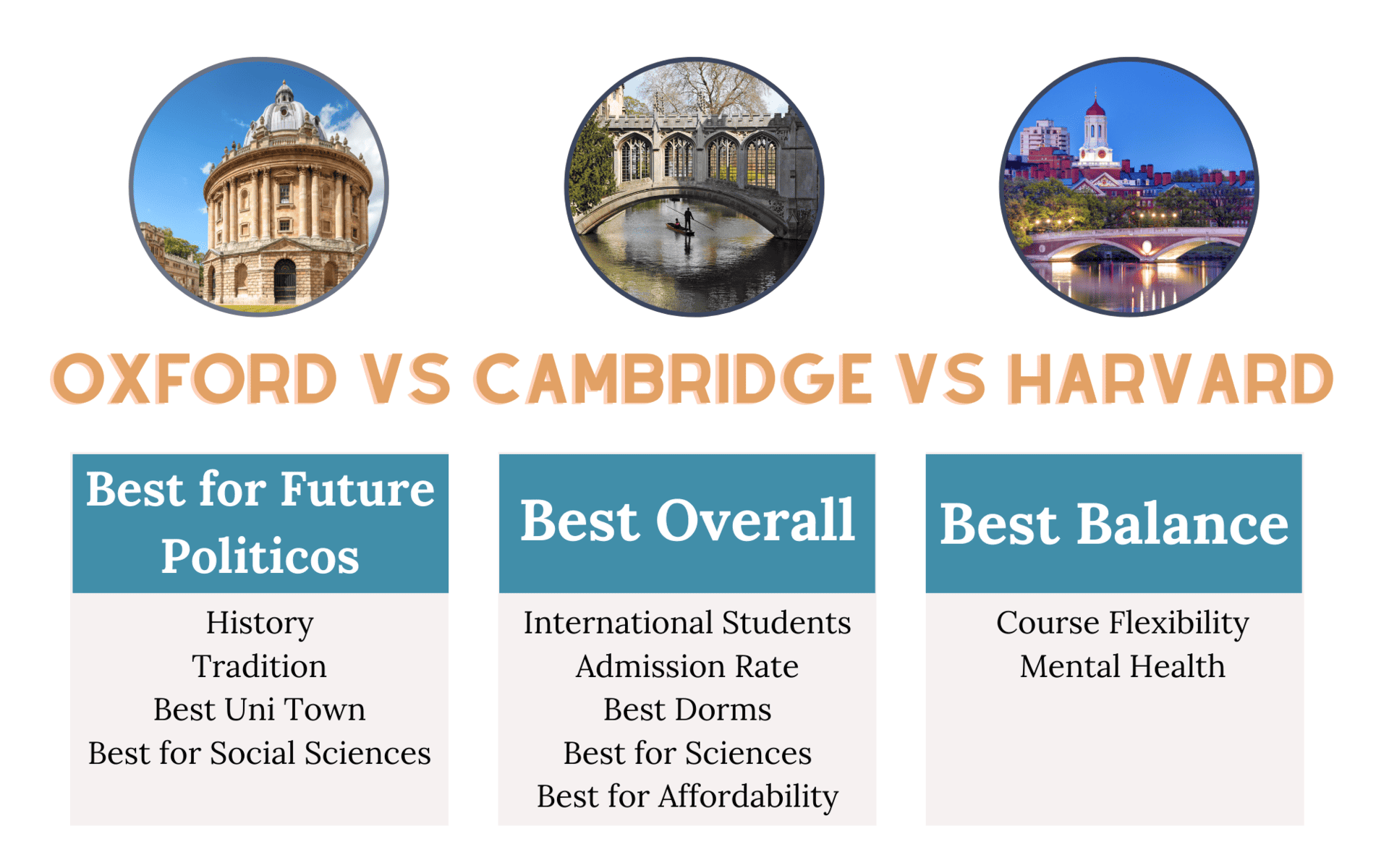
Oxford vs Cambridge vs Harvard: An Introduction
In the British system, a university degree (never called college) is typically a 3-year undertaking. An institution of higher learning accepts students into a single program, not into the university as a whole.
Oxford and Cambridge are the most prestigious universities in the UK. Like binary stars, they’re often mentioned alongside each other. They even have their own couple name. Oxford and Cambridge are known as “Oxbridge,” and their rivalry is enhanced by the rule that you’ll only be able to apply to one of them.
That means that unless you take a gap year and improve your application next year, you’ll get just one shot at an Oxbridge acceptance at the undergraduate level.
Cambridge and Oxford are both Russell Group universities, made up of universities in the UK with the highest research output. Akin to the US’s Ivy League, Russell Group universities have prestigious faculty who bring in research grants and prioritize breakthroughs in their fields, though not necessarily undergraduate teaching.
Applicants to both schools also set their sights on other prestigious UK universities like London School of Economics and Political Science (LSE), Imperial College London, Durham University, and the University of Essex.
Over in the US, Harvard University got its start as Harvard College where today it educates undergrads in 4-year degree programs. Today, it’s an Ivy League college, one of a group of US academic superstars, and one of the world’s most prestigious universities.
While other constituent schools emerged to educate grad students, all undergraduates are still educated within “Harvard College” at Harvard University today. The main “Cambridge” campus includes Harvard Yard. However, the university itself has spread into adjacent areas across the Charles River in Allston, and even a medical campus further afield. That means new students, especially, are always a stone’s throw from the main library and classrooms.
Harvard competes with the likes of California’s Stanford University, Princeton (in New Jersey), and Caltech.
While there are significant differences between all three schools, let’s try to rank them based on who would thrive best at each.
Course Flexibility
Winner: Harvard University (especially if you have an interdisciplinary career in mind)

Students spend their undergraduate years working through a program in the department of their major (called a course). There’s a set group of core classes they’ll take. While there are electives within the course, few students will take classes outside their departments at all. Joint courses, sort of combo deals, also come with their own set of courses and electives.
Because students focus on a single subject or two related subjects in the UK, they stick with a cohort of course-mates through all three years of study.
Harvard, like many US schools, requires students who major in one area (called a concentration at Harvard) to take roughly 14 courses in their field, which leaves students about 2.5 years worth of “other” courses, for a total of 4 years of study.
What will you take? There are writing, quantitative, language, and diversity general education requirements. There’s some flexibility to take gen ed classes in the departments and subjects you like for added interdisciplinarity. General education requirements will take place outside your major/course, with fewer familiar students.
Both systems offer a high quality of education.
Which is the best university for your undergraduate education? If you have a future, specific job description in mind that crosses disciplines, think about Harvard. It’ll allow you to combine interests in more niche ways. From accounting + fine art (open a gallery!) to robotics + archaeology (your ocean exploration startup awaits!) you won’t be able to dive deep into so-called “unrelated” areas at Oxford or Cambridge.
The History of Cambridge, Oxford, and Harvard Universities
Winner: Oxford University for sheer historical wow-power
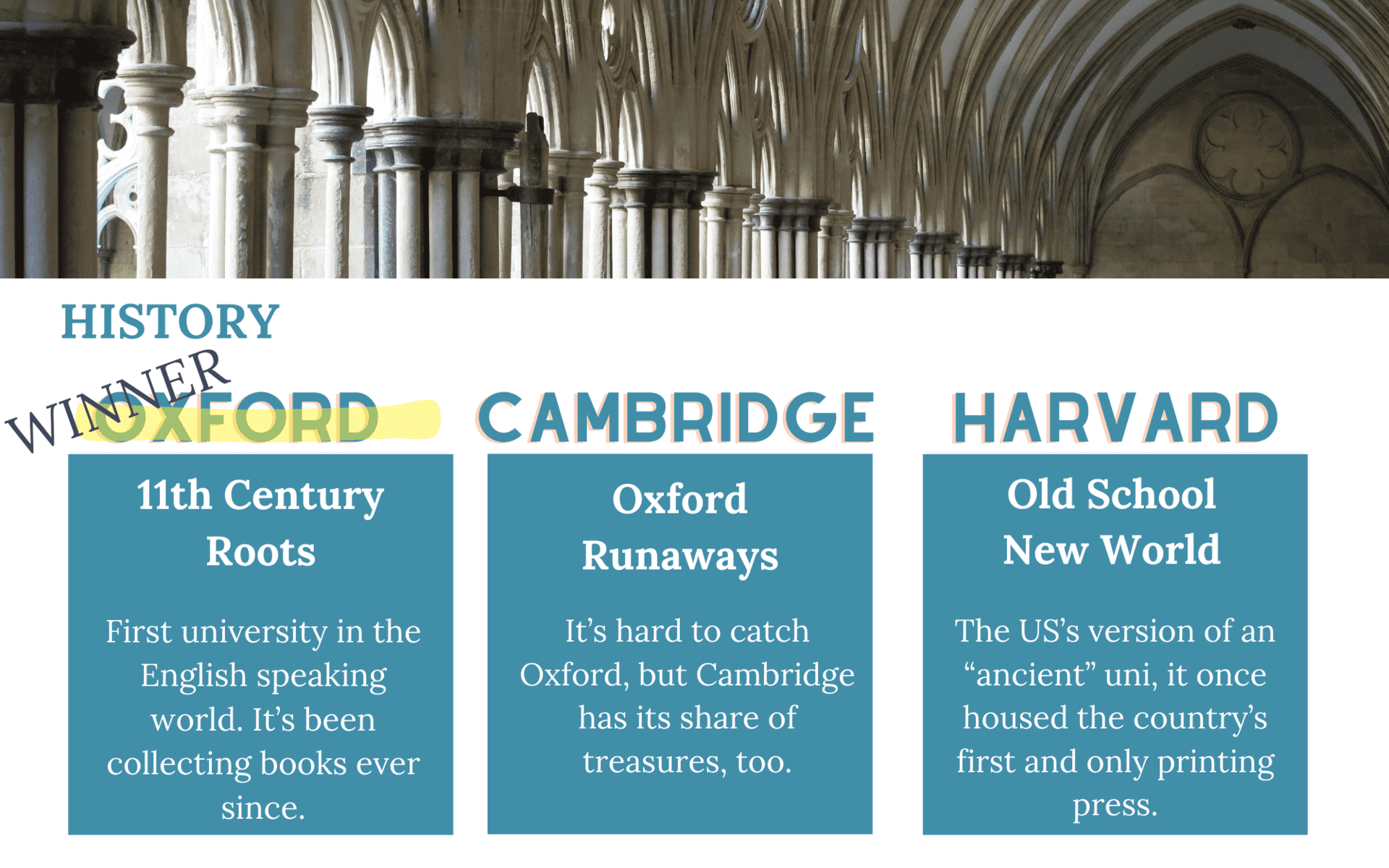
Established in 1636, Harvard University is the oldest university in the US. It was chartered by the government of Massachusetts Bay Colony for the education of the clergy with a boost from benefactor John Harvard. Himself a Cambridge grad, Harvard quickly established itself as uniquely American: 8 grads were signatories of the US Declaration of Independence.
Founded in 1209, Cambridge University got its start when students from Oxford splintered and founded their own academic home base. There’s always been tension and friendship between the sister institutions, and rumors say you can walk between the two, never leaving college-owned land (you can’t). Cambridge is the second-oldest university in the English-speaking world.
But the real heavy-hitter in this category is Oxford. The oldest university in the English-speaking world, Oxford, actually doesn’t have an exact founding date, though many trace its origins to 1096. It has had a royal charter since the 1200s. The collegiate system has been around since 1249, including Balliol and Merton Colleges, which come with indescribably gorgeous cloistered halls, cheerful courtyards, and hidden nooks.
Oxford’s long history gives it advantages over its prestigious competitors:
- The Oxford libraries have been some of the world’s largest since the 16th century. It houses rare manuscripts by virtue of its ability to collect important documents from the very beginning of its history. From jest-books to penny dreadfuls, Oxford’s once “contemporary” collections are now priceless. That includes “incunables,” books published before the 16th century.
- Some of Oxford’s treasures even pre-date the university itself. Take their ash-preserved papyrus that once saw Mt. Vesuvius erupt in 79 AD.
- The Bodlein Library itself is a jewel box of fairytale proportions. Its oldest reading room will make you grateful to be alive.
- For science students, Oxford’s longevity has lent itself to ongoing experiments that last across the generations. Take Oxford’s long-working dry-pile battery, which has continually (albeit now weakly) rung a bell for over 175 years.
- Oxford University Press allows the university to dictate the academic trends of the UK and beyond, as well as adding to its library collections. The library, by the way, has owned every book published in Britain since 1610, so at this point, the collection is unparalleled.
- Endowments are astronomical. With a millennium of experience, investments, land holdings, and investment dividends help Oxford’s colleges invite more diverse students from all backgrounds to study in its venerated halls. Wealth also allows colleges to offer some fringe benefits in the way of support, from on-site nurses to mental health professionals.
Its libraries are practically ozoing books like porridge into the streets of this medieval university stronghold. Its holdings and its traditions? They’re both ancient. Which brings us to…
Tradition at Oxford, Cambridge, and Harvard
Winner: Oxford University, for the sheer number of rituals
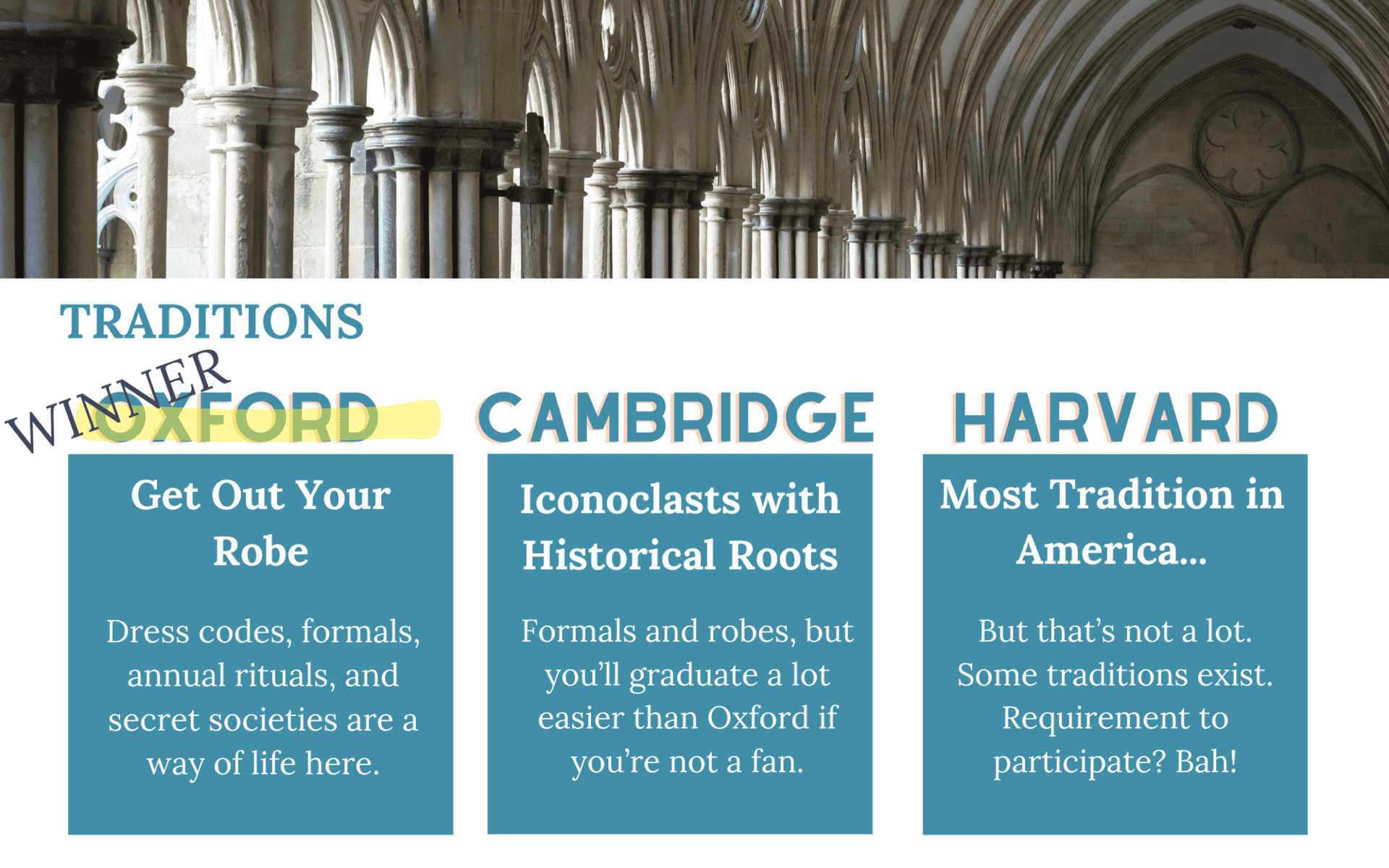
This is a tough category. Many Oxford University students show up in the halls of this historic institution for its history. They don their robes. They don them again. And again. They take exams in them. They go to dinner in robes, sipping a different wine with every course of their multi-course feasts before heading to their secret societies. Wait, what?
Traditions on the level of Oxford are an odd concept outside the context of UK culture. However, these types of rituals have pretty cool benefits.
If you desire:
- Participating in traditions that predate your birth
- Rules about your clothes and walking on the grass
- Fancy dress balls
- To learn new ways of being in the world, that are old ways of being in the world
- To get a heaping dose of culture
- To feel belonging to something larger than yourself
- To participate in inside jokes and little-known knowledge about your university
- To hear of secret societies and invite-only dining clubs
- Special “Oxford time” quirks like a bell that rings at 9:05 pm and that local time is 5 minutes behind Greenwich time
- To participate in longstanding rituals like walking around backwards in robes at 2 am, throwing pennies at children on Christian holidays, or tying a duck to a pole (now, thankfully, wooden rather than dead, as in the past)
Well, then, Oxford is your winner. But remember, class, race, and religious differences might make these in-group traditions feel less fun than they’d otherwise be. They’re only fun if they’d be fun for you.
Best for International Students: Oxbridge or Harvard?
Winner: For Cambridge, taking care of international students is old hat
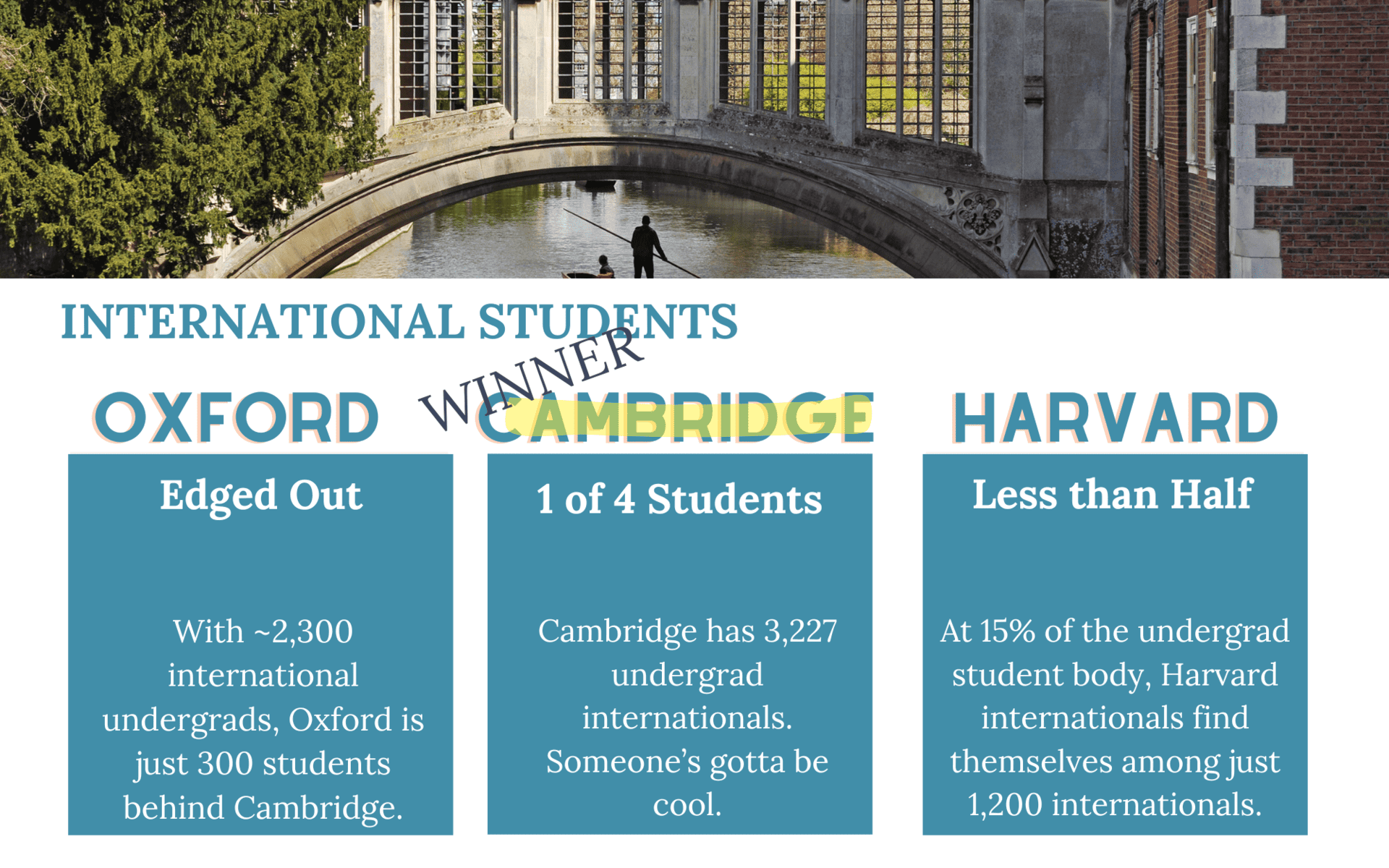
At Oxford University, the undergraduate student body is 23% international, so you’ll be able to make friends with 2,917 other outsiders.
Harvard’s student body is 15% international at the undergraduate level. That’s about 1,200 fellow internationals.
But Cambridge University has the edge. At Cambridge, 25% of the school’s ~9,000 undergraduates are international, for a total of roughly 3,227 fellow outsiders.
For friendship, Cambridge wins the day for undergraduates.
Best for Mental Health
Winner: Harvard, for better work/life balance
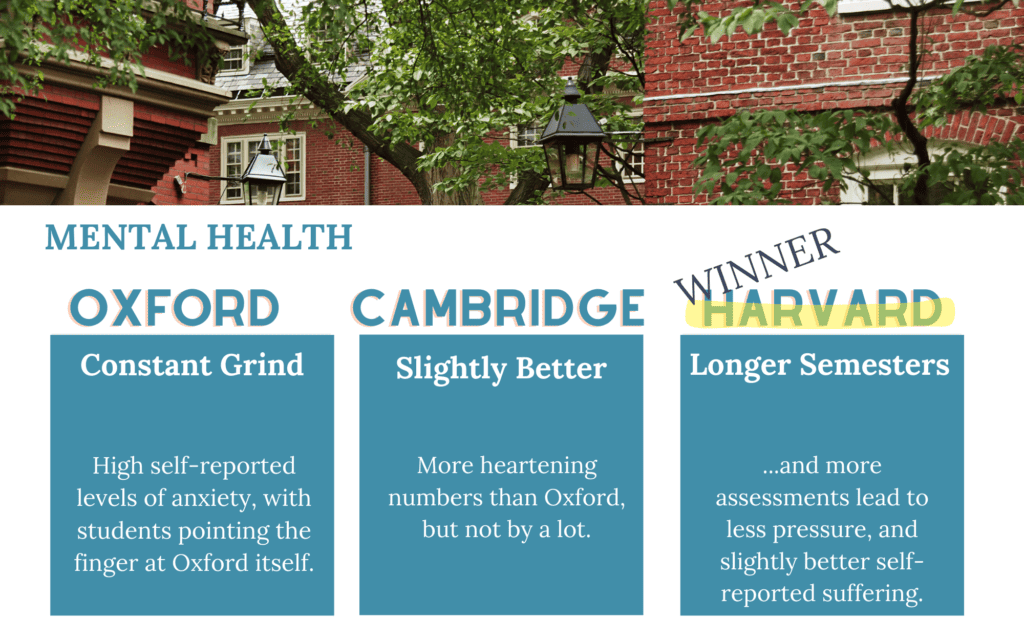
All three universities show similar, very high numbers of students suffering. And those numbers have worsened at similar rates over the past few years. All three survey students annually to keep a finger on the pulse of student mental health. All three offer on-campus counseling.
There’s not much demonstrable difference in these three pressure cookers.
-
- Harvard Mental Health: Harvard’s own internal mental health report brings some core problems to light: 31% of undergrads experience depression, 30% report anxiety, and 62% report high loneliness in their first weeks on campus.
-
- Oxford Mental Health: Oxford’s internal data is similar, with 34% of students saying they suffer from anxiety. And in a huge red flag, almost 2/3 of students surveyed said their mental health suffered since coming to Oxford. 95% claim it’s because of Oxford itself.
-
- Cambridge Mental Health: Cambridge students suffer, too, with 21% diagnosed with depression and another 1/4 believing they have depression.
But some stats stood out to us:
-
- Mental Health: Cambridge and Oxford, as well as other Russell Group universities in the UK, have tough-to-find student satisfaction scores in part because the surveys are run by an organization that uses results to allow tuition raises for students who fill out the surveys. Students boycott, so that the data doesn’t meet threshold levels for reporting.
-
- Academic Life and Mental Health: Oxford and Cambridge typically have a condensed 8-week semester schedule, followed by an examination at the end. Exams count for much of a student’s grade, and less guidance is given ahead of time about what a particular professor is looking for than in US Schools. That can leave students under more pressure than in the US, where consistent assessments and assignments throughout a class make it less dire when you tank on something.
Alongside concerns that health insurance costs can be comparable ($500 on the low-end for international students in the US vs $593 for NHS registration in the UK), the edge goes to the university with a more vibrant, holistic work/life balance during crunch time— Harvard.
Is Harvard, Cambridge, or Oxford Easy to Get Into?
Winner: Admission Rates Favor Cambridge
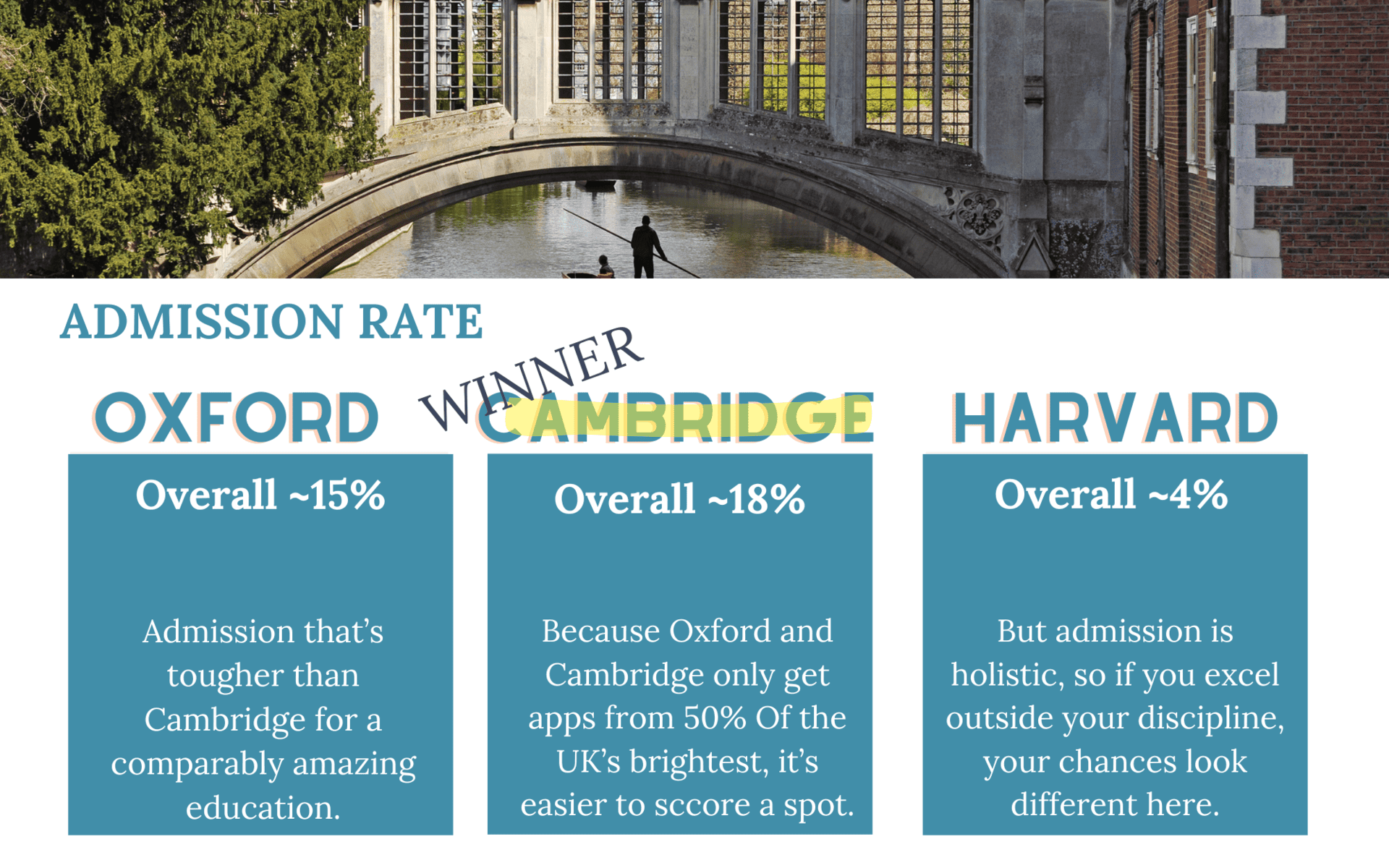
Oxford: The admission rate in 2021 was 14.8%.
Cambridge: The acceptance rate at the University of Cambridge was about 18.3% in 2022. But fair warning: both Oxford and Cambridge have their own admissions tests in many subject areas, from music to history, geography, and computer science.
Looking to get into Harvard University? Their tiny 3.7% acceptance rate makes it hard.
That looks like Cambridge is an easy winner. But hold your horses. This is a fuzzy category. If you have the requirements for all three schools, a high GPA, and stellar test scores, your chances depend on many factors. Let’s look at some things that make these rates more complicated:
- Low international acceptance rates at Oxford and Cambridge. Students are forced to apply to either Oxford or Cambridge as undergrads, not both. That means that high-achieving British students are likely to apply to one or the other. That automatically cuts the application rates at both schools in half and, presumably, doubles the acceptance rates. The same system does not apply to international students, who may not be eyeing those two schools so intently but may apply across the globe. The acceptance rate for international students is likely much lower.
- Course compare at Oxford and Cambridge! Some courses/majors have high acceptance rates. That makes both Cambridge and Oxford “harder to call” than Harvard, which admits students at the same rate regardless of what they intend to study.
- Based on the UK university application portal’s data, some Oxford courses that are easiest to get into include music (with a 54% acceptance rate), European and Middle Eastern Languages (48%), and Modern Languages (47%).
- At Cambridge, your best shots are in the departments of music (46%), classics (43%), and philosophy (40%).
- Jack of all trades? Harvard’s for you. Harvard accepts students based on categories including personal, academic, extracurricular, and athletic. Test scores are far more important at British schools (and you won’t even be asked about your personal circumstances, unless you can work them into your personal statement about literature). So, if you’re a literary genius and never picked up a ball in your life, your chances may look much better at a UK school. If you have a unique history that makes you shine, Harvard and the US system may be better for you.
Cambridge still wins. Cambridge musicians? That’s where it’s really at.
World University Rankings
Winner: It’s a Draw. Your Own Department Rules.
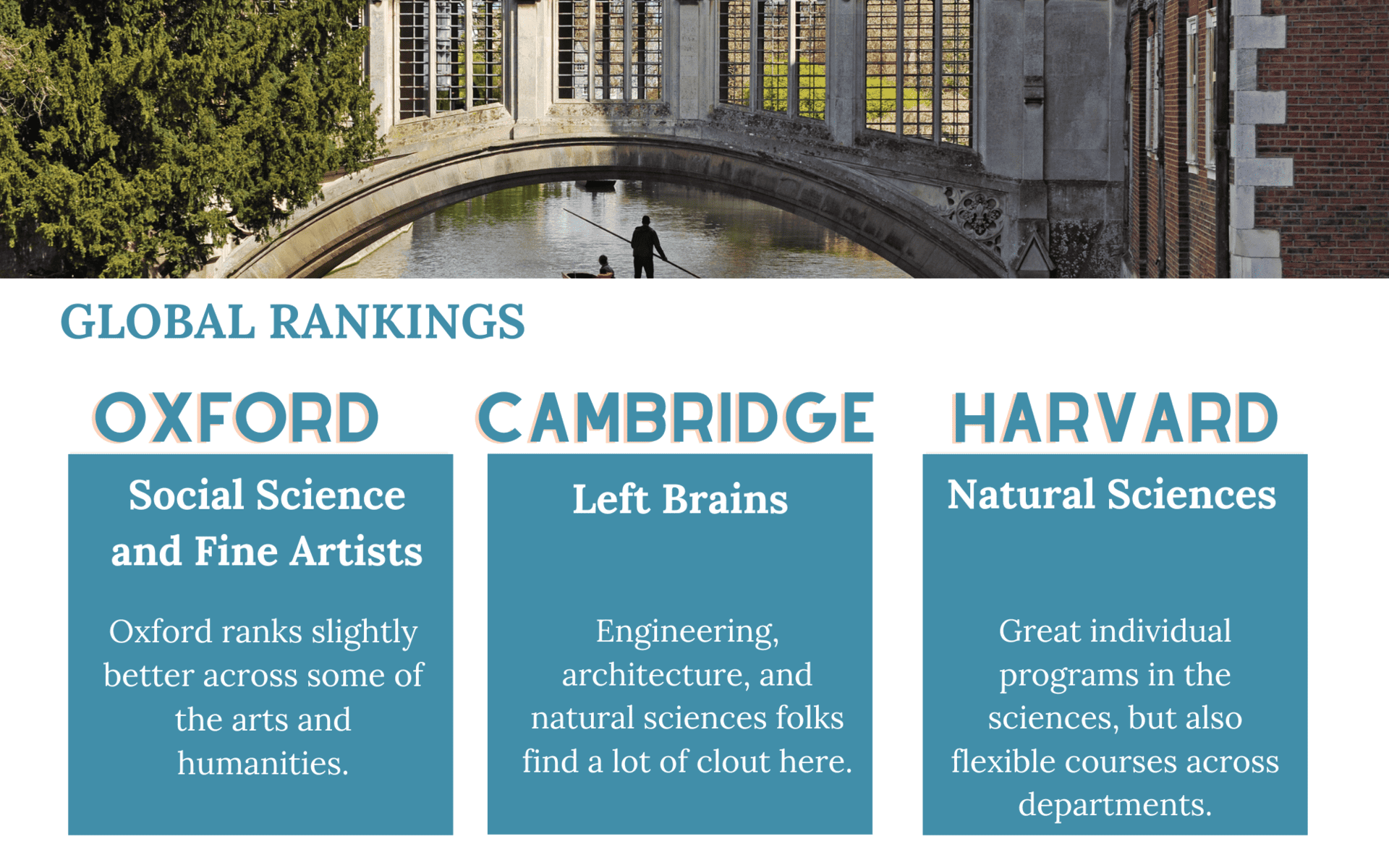
The 2024 Times Higher Education rankings favor Oxford (#1), then Harvard (#4) and Cambridge (#5).
The QS World rankings give Cambridge (#2) the edge, followed by Oxford (#3) and Harvard (#4).
Harvard bags 31 Nobel prize winners while Cambridge boasts 20 and Oxford takes 12 (that’s counting by the university affiliation of the winner at the time of the announcement, so no fair hiring Nobel Laureates later).
They’re all very prestigious, and their names and rankings shift with the latest and greatest new hire and research grant.
What’s an 18-year-old to do?
Consider the ranking of your major.
Future engineers will choose Cambridge.
Natural sciences get the edge at Harvard or Cambridge, leaving Oxford off the podium.
Arts of humanities? Oxford takes the prize (Cambridge doesn’t offer fine arts).
Architects? You better choose Cambridge, because Oxford doesn’t even offer a course for you.
Battle of the University Towns
Winner: Oxford, for Small Town Cozy within Range of London
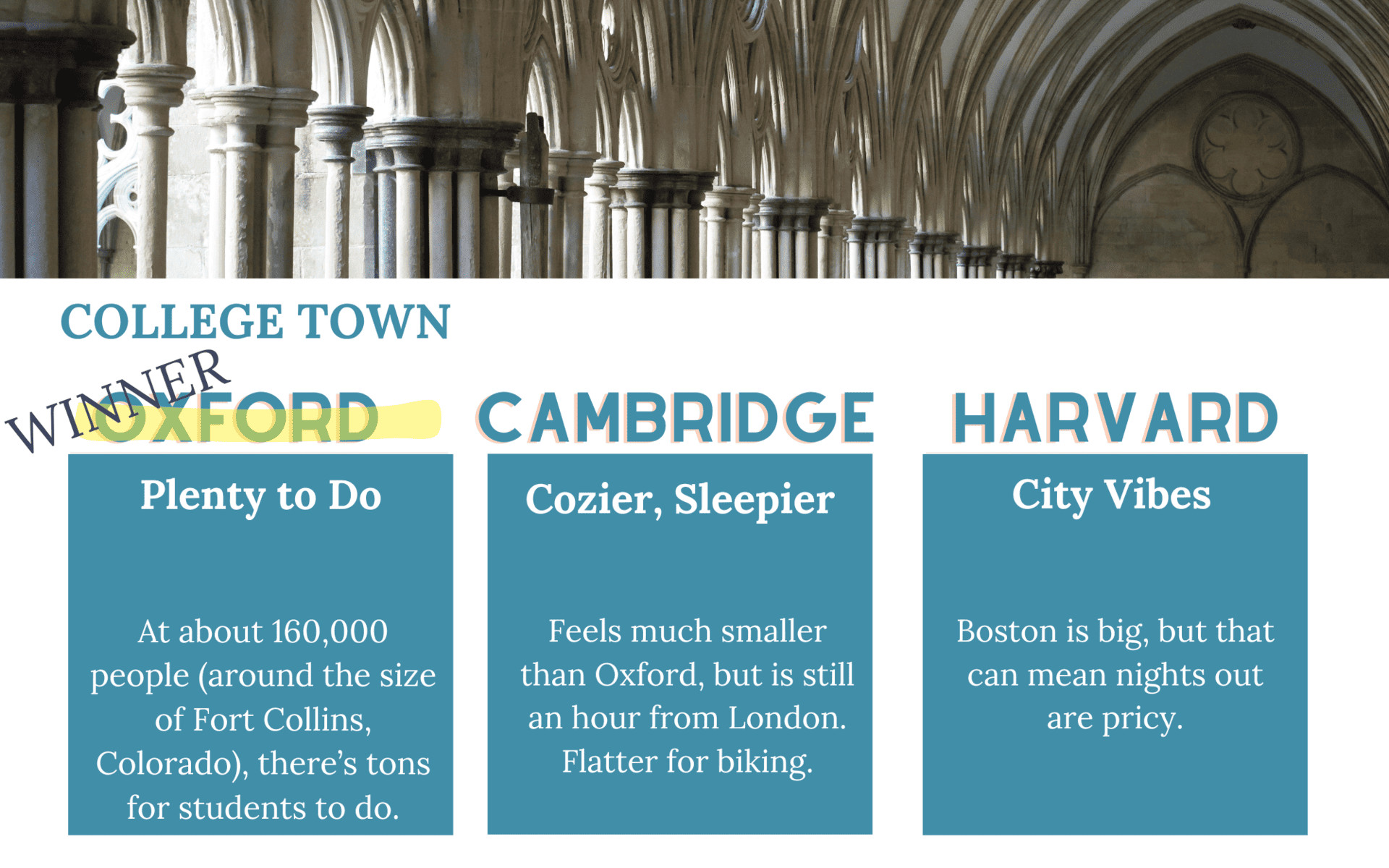
Cambridge students have a tiny town on the River Cam.
University of Oxford students have better uni-town sized nightlife.
Harvard students get the big city at their fingertips, although it’s often covered with snow and ice. How do you compare?
Small, medium, or large? We chose the bed that’s just right. With more to do and the global city of London just an hour away with several daily buses, Oxford has everything sleepy Cambridge doesn’t: industry outside the university! More shops! Pubs and clubs outnumber Cambridge’s! Add a hillier, prettier landscape, and we think there’s more to do in Oxford, while remaining walkable for college students.
Over in the US, students in Cambridge, Massachusetts (fairly cloistered, yet close to Boston) have the big city at their fingertips. While we want to rank the US high on the cultural norm of having shops open in the evening (come ON, England), the area just isn’t as student-friendly as a university town with all of the UK’s rad public transportation.
Who gets the point on this one? It’s Oxford.
Best Dorms
Winner: University of Cambridge
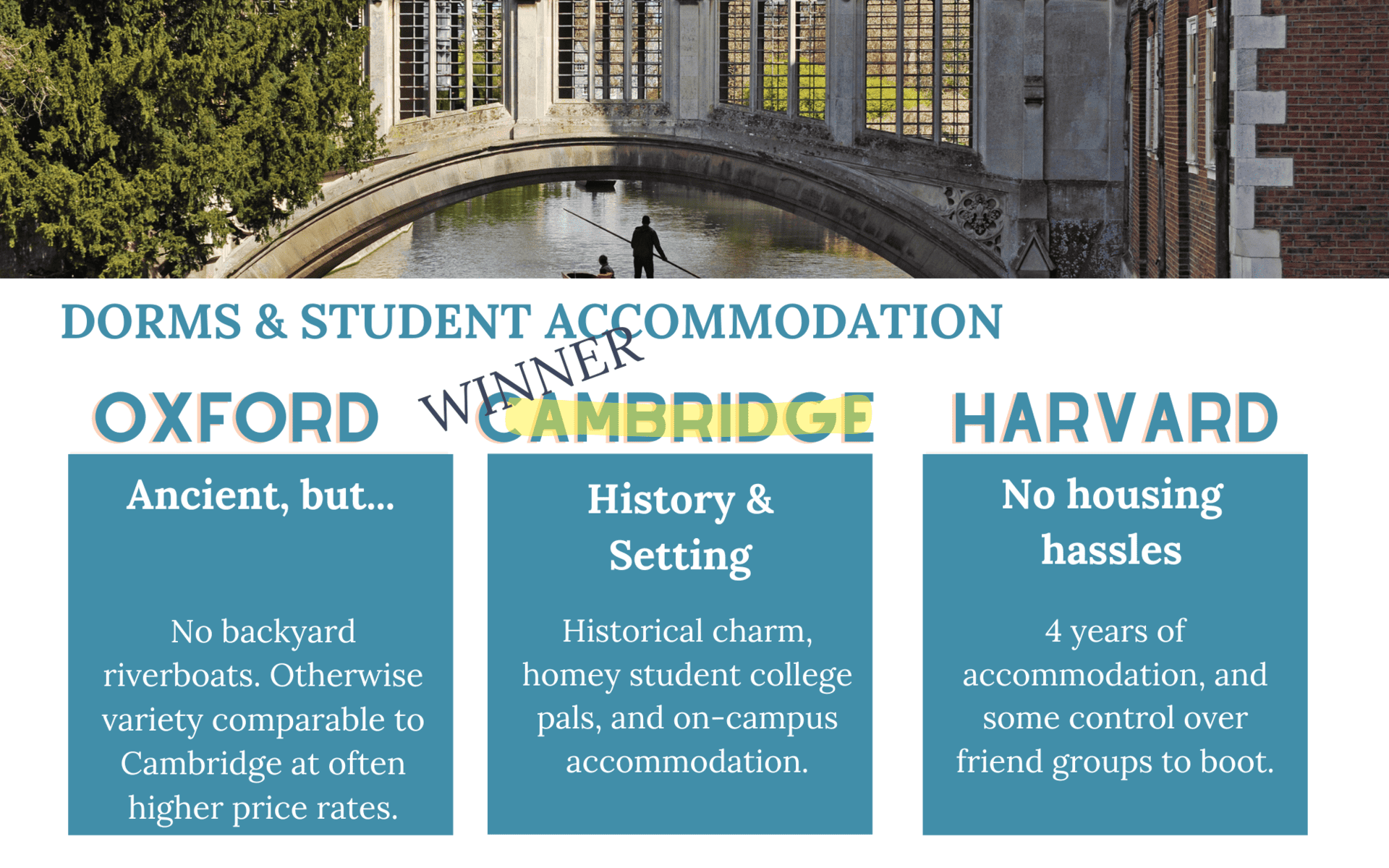
Harvard guarantees housing for all students for 4 years, which can make it look a little like Oxford and Cambridge, without the “college pride” that comes from being ensconced in a small social group throughout your education.
At Harvard, freshman dorms house first years in their own little dorm area right on historic, leafy Harvard Yard. In your 2nd, 3rd, and 4th years, Harvard students move to “houses” outside the Yard. Houses are typically larger and more impersonal than Oxbridge colleges. Still, similarly, they come with their own libraries, dining halls, courtyards, and gyms, making their actual living spaces somewhat equivalent (keep in mind, they won’t have their own bars in the US).
Students in years 2 to 4 can’t choose the building they’ll live in, but they can express allegiances with friends through “blocking groups” and “linking groups” – a process that keeps buddies together.
However, housing assignments, in other words, which building you’re in, are random.
Once assigned, friend groups will be welcomed to their home for the next 3 years with a welcome dinner, recollecting a little of the camaraderie and tradition Oxford and Cambridge are known for.
While 2nd to 4th-year dorm buildings have mascots, the random assignment process means that each house doesn’t have the differing personalities, along with all the stereotypes and baggage that Oxford and Cambridge colleges have.
98% of Harvard students live on campus all 4 years.
At Oxford and Cambridge, students apply to a college as part of applying to their program. If they’re not accepted, they may be pooled and chosen by another college, then offered a spot.
That means that college allegiance shines through at both universities. One’s college can often be as important as the university itself. And many colleges come with not only accommodation, but an entire identity and friend group. That’s not even mentioning balls and formal dinners that require wearing university robes.
Oxford and Cambridge housing at their best can’t be beat. Youi’ll look out over ancient courtyards, share cozy attic eaves with 14th-century ghosts, wonder over gorgeous exposed beams, and quite possibly live in the former room of legendary former prime ministers or literary giants.
At their worst, both universities have ancient rooms that are small, drafty, and haunted, with low ceilings.
So, what are the main differences between Oxford and Cambridge housing?
Cambridge housing takes the edge: there are multiple colleges at Cambridge that back to the River Cam, and are so picturesque that students say tourists punting on boats through their backyards is a big problem.
However, both Oxford and Cambridge suffer from inconsistent housing options and a system that’s not random, so first years often get some of the smallest, awkward, old, and uninspiring housing. Cross your fingers and know you’re still saving compared to Harvard prices.
Big Boom for Scientists
Winner: Cambridge, Ever Since the First Apple Hit Newton’s Head

Cambridge has an unassailable pedigree in the sciences. After all, Stephen Hawking did his postgraduate work at Cambridge, then taught there for decades, and his legacy is still palpable around the campus, just like his memorial bearing the Hawkins entropy equation and the giant Grasshopper Clock that he once unveiled.
Cambridge’s star-spangled alumni include:
- Isaac Newton (a tree from the graft of his apple tree grows on campus)
- Charles Darwin
- Alan Turing
- Francis Crick
- Thomas Malthus
At Cambridge, you’ll also get global top ten global programs in biology, biotechnology, cell biology, mathematics, cell biology and genetics, endocrinology, and space science. You can take veterinary science here, which you won’t get at Oxford at all. And at Harvard, you’ll have to wait until your graduate-student years to apply for veterinary science (as is a US policy).
Social Scientists of Tomorrow
Winner: Oxford, Especially for Future Politicos
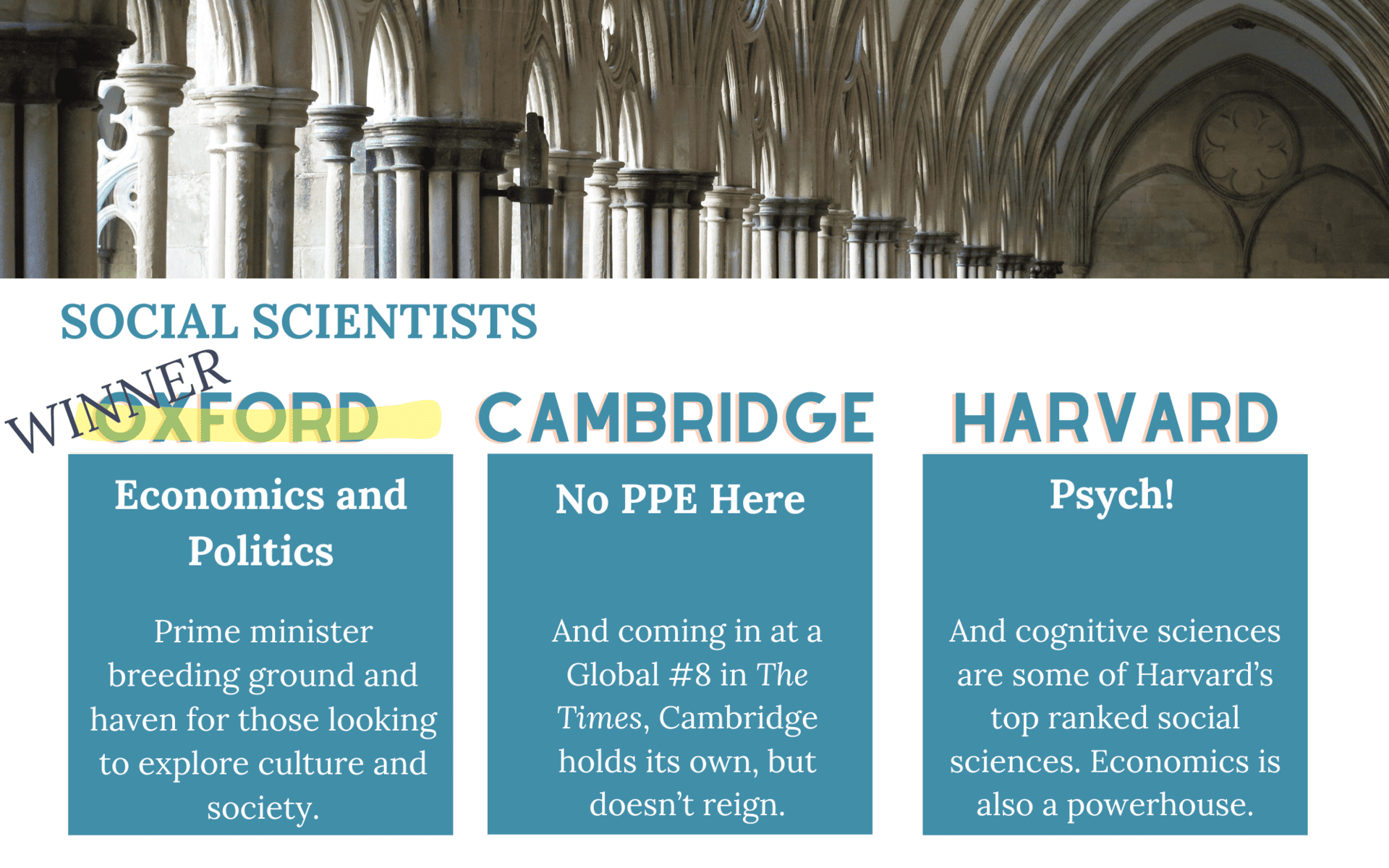
Social Sciences like Philosophy, Politics, and Economics (PPE), a popular European major favored by those looking to run for office, are Oxford’s bread and butter. At the graduate level, social scientists outnumber humanities students, scientists, and medical students.
World leaders have proven the system. Oxford’s welcomed 30 future prime ministers. Compare that to Harvard’s mere 8 presidents. To be fair, Harvard’s admission rates and its dead president count are slim because the US is a much larger country than the UK, with a population to match.
With alumni like John Locke, Adam Smith, and Thomas Hobbes, Oxford has been strong in politically-minded social sciences for centuries. It’s high international-student enrollment solidifies its position as a global heart of social science research.
Costs
Winner: Cambridge for Tuition, Fees, Student Housing, and Cost of Living
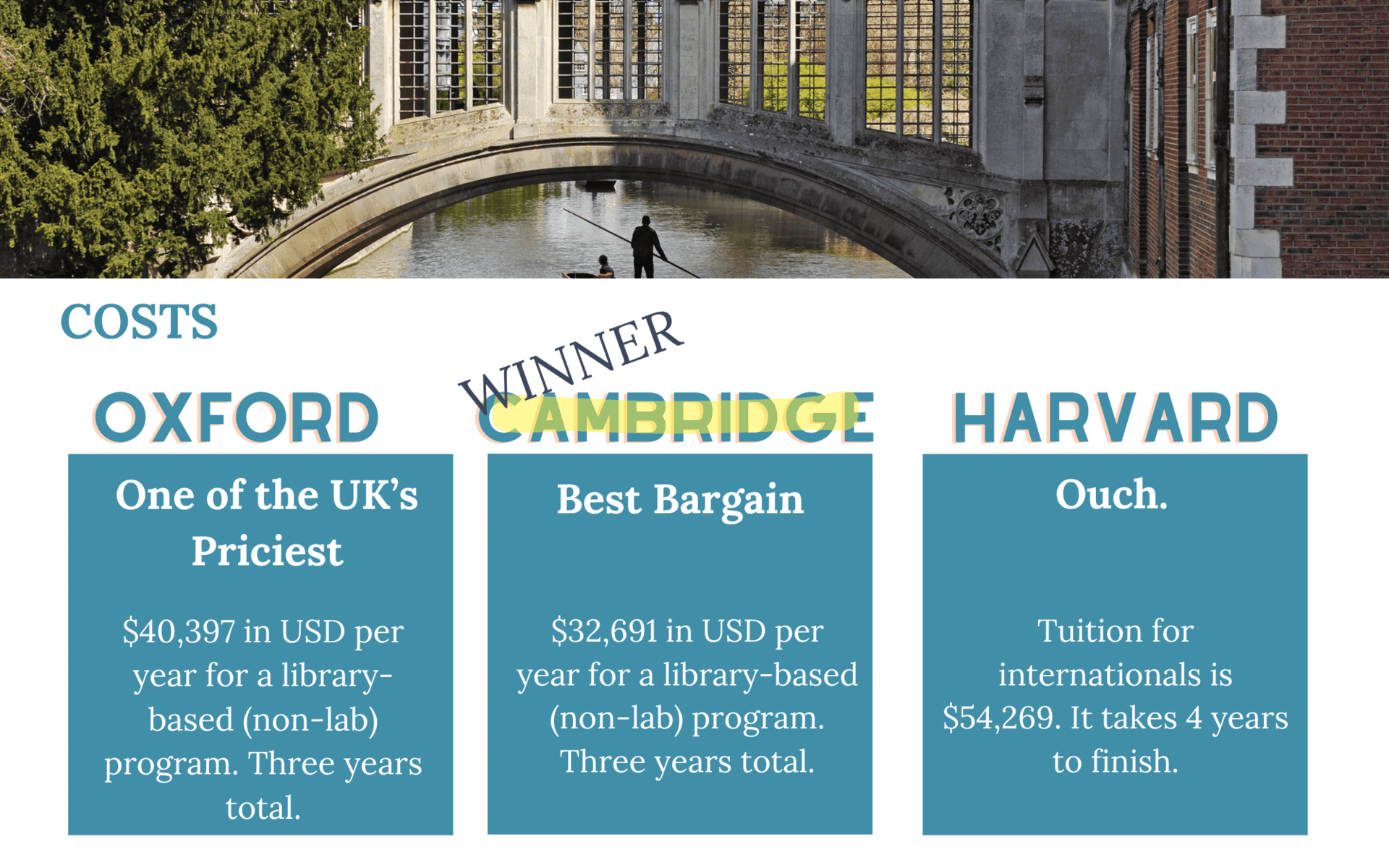
Cambridge comes out ahead in the tuition competition for international students: Oxford’s international student tuition and fees are $40,397 for non-lab social science majors, while Cambridge’s $32,691 is a meaningful savings. At Harvard, the $54,269 tuition (and 4th year of attendance – ouch) can be painful.
The cost of living favors Cambridge, too. The cost of living in Boston is 36% more expensive than Oxford. And Oxford is more expensive than Cambridge. Add another year of education to your Boston bill and Cambridge starts looking like a major bargain.
For dorms, Cambridge comes out ahead again. Harvard prices are exorbitant, coming in last place: dorm rooms cost $12,424 with food boosting the price another $7,950. Compare that to Oxford’s estimated averages (converted from pounds in February 2024) of ~$9,500 for accommodation and ~$4,575 for food and Cambridge’s average estimates of $6,100 in housing and $2,116 for food.
Three for three? You’ll save the most at Cambridge in every area of your budget.
The Overall Winner: That’s Cambridge
Cambridge comes with all the charm, academic prowess, and cost savings that you could ask for. So if your academic interests can be narrowed to a specific, traditional disciplinary area, and you’re happy to focus your efforts (and often your social life) there for 3 years, you’ll come out ahead in Cambridge.
Check out each university individually by reading the complete Oxford University and Cambridge University write-ups, with student interviews, and diving in deeper on England’s different educational system compared to the US. You can also compare the two British lookalikes head-to-head.
Thinking neither of these British superstars is your cup of tea? Look at other UK universities that are strong in academics, like St. Andrews in Scotland or Durham University in the north of England.
Related Posts

Jessica Share
Jessica is the writer, Ph.D., and mom-of-an-abroad-student-in-the-UK at the helm of College Abroad Guides. When she's not asking college students where the coolest place to hang out in their city is, she's figuring out how she can make $60 imported Greek oregano potato chips and £50 British bacon potato chips appear on her doorstep for the cost of a local bag of Lay's.





